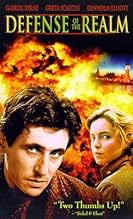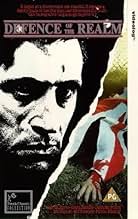IMDb RATING
6.5/10
2.6K
YOUR RATING
After a newspaper reporter helps expose a Member of Parliament as a possible spy, he finds that there's much more to the story than that.After a newspaper reporter helps expose a Member of Parliament as a possible spy, he finds that there's much more to the story than that.After a newspaper reporter helps expose a Member of Parliament as a possible spy, he finds that there's much more to the story than that.
- Won 1 BAFTA Award
- 7 wins & 2 nominations total
Danny Webb
- Danny Royce
- (as Daniel Webb)
- Director
- Writer
- All cast & crew
- Production, box office & more at IMDbPro
Storyline
Did you know
- TriviaGabriel Byrne once said of his scene-stealing co-star in this film "never act with children, dogs, or Denholm Elliott!"
- GoofsWhile details are secret, it is generally assumed that a nuclear weapon has to be 'armed' before it would explode.
It would be absurd to have bombs in an aircraft that would wipe out the entire airbase if an aircraft crashed on landing.
- Quotes
Vernon Bayliss: Vodka and Coca-Cola. Detente in a glass!
- Crazy creditsThe research done for this film is shown by the acknowledgment at the end of the credits: "The Producers wish to thank the STAFF and MANAGEMENT of THE TIMES NEWSPAPERS FOR THEIR HELP."
Featured review
Beginning with the later years of the Cold War and extending to this very day, there has been this question about the enemies of a nation: are the ones within more dangerous then the external ones? This question has produced quite a few intriguing thrillers over the years and one such is Defence Of The Realm from 1986. This film looks at that question from the perspective of late Cold War UK politics and in turn presents a realistic yet tense thriller in the process.
The film has a fine cast of some of the UK's best actors and character actors of the time. Leading the cast is Gabriel Byrne as reporter Nick Mullen who finds himself writing one story and then follows a trail of breadcrumbs that leads him to discovering he has in fact been used. That trail of breadcrumbs belongs to Mullen's colleague and mentor of sorts Vernon Bayliss in a BAFTA winning performance from Denholm Elliott who makes the most of a small part. Helping Mullen is Greta Scacchi as Nina Beckman, the assistant to a Parliament member (played by Ian Bannen) caught up in the events. They are aided by Bill Paterson as Mullen immediate boss and opposed by David Calder as the newspaper's editor and Fulton Mackay as the owner of the newspaper Mullen works for. Also in a small role is an early appearance from Robbie Coltrane as a fellow reporter in a few scenes. The result is that the film is well anchored by a fine cast.
The film is helped out by the realism of the production values. This is especially true of the production design of Roger Murray-Leach who, working with what was likely a small budget, nonetheless created a whole plethora of sets ranging from newsrooms to a U.S Air Force base before taking us inside the secret halls of the government. Roger Deakins cinematography gives the film a sense of claustrophobia at all times even when the film ventures into wide open spaces. The result of this is amplified by the editing of Michael Bradsell and the score from Richard Harvey to create an almost continuous sense of menace throughout the film. All this comes together under the direction of David Drury to give the film a strong sense of realism.
The production values though take that realism from the script by Martin Stellman. The script looks at the question mentioned in this review's opening and does so through the lens of late Cold War Britain. At a time when Cold War tensions were increasing and a good deal of the public clamored for the government to do something about it, the film looks at how far a government and its national security apparatus might go to prevent a scandal that could bring about just that. What appears to be just another sex scandal involving a high ranking member of the British Parliament who has ties to the Defence establishment ( that is itself is highly reminiscent of the 1963 Profumo affair) might in fact be covering up something that seems completely unrelated: a police chase of two escaped teenage prisoners that accidentally crossed over onto a U.S Air Force base sometime before. The script takes Mullen and those he encounters on a journey into the secret workings of the British government. As it reaches it climax the film asks an important question: when does a government's ability to protect secrets cross the line into becoming something much more darker, threatening and even criminal? By combining a fine cast, production values and a fine script Defence Of The Realm is able to create a realistic yet tense thriller. While it may be set and more or less about late Cold War UK politics, the film asks questions that are relevant today. All of these elements come together to make Defence Of The Realm far more then just another thriller and ever watchable nearly twenty-five years on from its original release.
The film has a fine cast of some of the UK's best actors and character actors of the time. Leading the cast is Gabriel Byrne as reporter Nick Mullen who finds himself writing one story and then follows a trail of breadcrumbs that leads him to discovering he has in fact been used. That trail of breadcrumbs belongs to Mullen's colleague and mentor of sorts Vernon Bayliss in a BAFTA winning performance from Denholm Elliott who makes the most of a small part. Helping Mullen is Greta Scacchi as Nina Beckman, the assistant to a Parliament member (played by Ian Bannen) caught up in the events. They are aided by Bill Paterson as Mullen immediate boss and opposed by David Calder as the newspaper's editor and Fulton Mackay as the owner of the newspaper Mullen works for. Also in a small role is an early appearance from Robbie Coltrane as a fellow reporter in a few scenes. The result is that the film is well anchored by a fine cast.
The film is helped out by the realism of the production values. This is especially true of the production design of Roger Murray-Leach who, working with what was likely a small budget, nonetheless created a whole plethora of sets ranging from newsrooms to a U.S Air Force base before taking us inside the secret halls of the government. Roger Deakins cinematography gives the film a sense of claustrophobia at all times even when the film ventures into wide open spaces. The result of this is amplified by the editing of Michael Bradsell and the score from Richard Harvey to create an almost continuous sense of menace throughout the film. All this comes together under the direction of David Drury to give the film a strong sense of realism.
The production values though take that realism from the script by Martin Stellman. The script looks at the question mentioned in this review's opening and does so through the lens of late Cold War Britain. At a time when Cold War tensions were increasing and a good deal of the public clamored for the government to do something about it, the film looks at how far a government and its national security apparatus might go to prevent a scandal that could bring about just that. What appears to be just another sex scandal involving a high ranking member of the British Parliament who has ties to the Defence establishment ( that is itself is highly reminiscent of the 1963 Profumo affair) might in fact be covering up something that seems completely unrelated: a police chase of two escaped teenage prisoners that accidentally crossed over onto a U.S Air Force base sometime before. The script takes Mullen and those he encounters on a journey into the secret workings of the British government. As it reaches it climax the film asks an important question: when does a government's ability to protect secrets cross the line into becoming something much more darker, threatening and even criminal? By combining a fine cast, production values and a fine script Defence Of The Realm is able to create a realistic yet tense thriller. While it may be set and more or less about late Cold War UK politics, the film asks questions that are relevant today. All of these elements come together to make Defence Of The Realm far more then just another thriller and ever watchable nearly twenty-five years on from its original release.
- timdalton007
- Sep 19, 2010
- Permalink
- How long is Defense of the Realm?Powered by Alexa
Details
- Release date
- Country of origin
- Language
- Also known as
- Button - Im Sumpf der Atommafia
- Filming locations
- Production companies
- See more company credits at IMDbPro
Box office
- Gross US & Canada
- $750,000
- Opening weekend US & Canada
- $19,938
- Nov 23, 1986
- Gross worldwide
- $750,000
Contribute to this page
Suggest an edit or add missing content




































